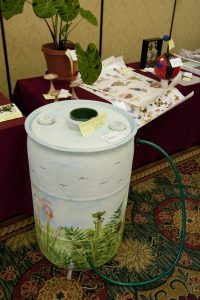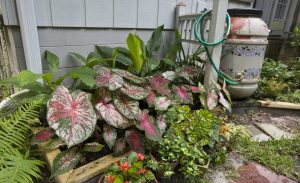
Photo courtesy Tyler Jones UF/IFAS.
Much more than a garden trend, rain barrels are an eco-friendly long-term solution to sustainable watering. They save money, promote water conservation and reduce the amount of stormwater runoff, potentially reducing flooding.
While rainwater is naturally soft and free of chemicals, consumers remain hesitant to install and use rain barrel water to irrigate their gardens and landscapes because of safety concerns with the water.
Just how safe is water harvested in a rain barrel? A team of three University of Florida scientists at the Institute of Food and Agricultural Sciences (UF/IFAS) in Fort Lauderdale sampled and analyzed the water from barrels, lakes and ponds throughout South Florida to find that answer.
“A common question I receive from gardeners is if the water is safe to use in their garden when it is coming off their ‘dirty’ roofs,” said Kimberly Moore, professor of sustainable horticulture at UF/IFAS Fort Lauderdale Research and Education Center (UF/IFAS FLREC). “Is it safe to use on a vegetable garden, especially when there is a potential for bacteria such as E. coli. The answer is ‘yes.’”
The study is one of the latest Extension documents published this month on Ask IFAS, the peer-reviewed website UF/IFAS Electronic Data Information Source (EDIS).
“Rain barrels have come a long way,” said Lorna Bravo, a co-author and urban horticulture agent who also serves as UF/IFAS Extension Broward County director. “Rain barrels come in all shapes and sizes and can be decorated to match the exterior décor of your home. Painting them helps prevent sunlight from entering and may reduce algae growth on the exterior of white or clear plastic barrels.”
Bravo also assures consumers that rain barrels are easy to install and have many advantages, such as reducing water bills by reducing potable water use in the landscape.
To better understand rain barrel water quality, the trio sampled water from 60 rain barrels throughout South Florida properties. They collected 25 samples from tile roofs, 20 from shingle roofs and 15 from metal roofs. They tested the pH, soluble salt levels and nutrient levels in rainwater collected from the three sets of roofs. They found no difference based on roof type.
To test for E. coli and coliform in the water, they purchased AquaVial Well Water testing kits typically used for drinking water, pool, pond, lake and well-water testing. They chose a mainstream kit they purchased online to imitate what any homeowner could buy and use. The water analysis showed no evidence of E. coli in any samples.

“We suspect that the high solar radiation and high temperatures in South Florida killed any potential pathogens on the roof surfaces,” said Moore.
From 1998 to 2016, the average levels of solar radiation hitting roofs in South Florida were recorded as extremely high, with roof temperatures ranging from 124 degrees to 150 degrees. Temperatures greater than 149 degrees will kill bacteria in water, and most plant pathogenic bacteria and fungi will die in soils at temperatures ranging from 130 degrees to 145 degrees, explained Moore.
Another finding indicated that nutrient levels were minimal, with no harmful elements found. There was also no difference in nutrient levels based on roof type, shingle, tile or metal.
The authors also compared rain barrel water quality data to water analysis from the ponds and city water on the UF/IFAS FLREC property and determined rain barrel samples were better quality for growing plants. They also sampled water from five ponds on the FLREC property as well as five garden hoses attached to city water lines in Davie where FLREC is located.
“Water from all sources, garden hoses, ponds and rainwater, was found to be acceptable for growing plants and vegetables,” said Mica McMillan, assistant professor of environmental horticulture at UF/IFAS FLREC. “Differences in nutrient levels, as well as salt levels, were minimal between all sources.”
###
Para accesar a esta comunicación en español, por favor utilice este enlace.
By Lourdes Mederos, rodriguezl@ufl.edu
ABOUT UF/IFAS
The mission of the University of Florida Institute of Food and Agricultural Sciences (UF/IFAS) is to develop knowledge relevant to agricultural, human and natural resources and to make that knowledge available to sustain and enhance the quality of human life. With more than a dozen research facilities, 67 county Extension offices, and award-winning students and faculty in the UF College of Agricultural and Life Sciences, UF/IFAS brings science-based solutions to the state’s agricultural and natural resources industries, and all Florida residents.
 4
4
